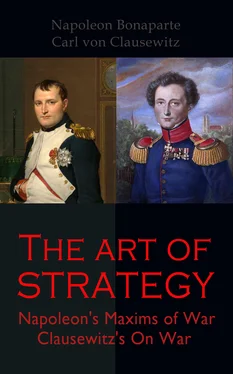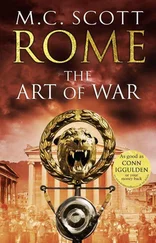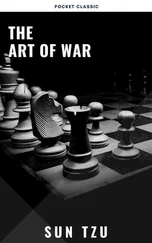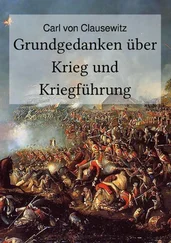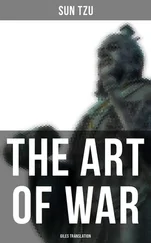Napoleon Bonaparte, Carl von Clausewitz
The Art of Strategy: Napoleon's Maxims of War + Clausewitz's On War
The Art of War in 19th Century Europe
e-artnow, 2021
Contact: info@e-artnow.org
EAN 4064066498757
Napoleon's Maxims of War
Clausewitz's On War
Table of Contents
PREFACE.
MAXIM I.
MAXIM II.
MAXIM III.
MAXIM IV.
MAXIM V.
MAXIM VI.
MAXIM VII.
MAXIM VIII.
MAXIM IX.
MAXIM X.
MAXIM XI.
MAXIM XII.
MAXIM XIII.
MAXIM XIV.
MAXIM XV.
MAXIM XVI.
MAXIM XVII.
MAXIM XVIII.
MAXIM XIX.
MAXIM XX.
MAXIM XXI.
MAXIM XXII.
MAXIM XXIII.
MAXIM XXIV.
MAXIM XXV.
MAXIM XXVI.
MAXIM XXVII.
MAXIM XXVIII.
MAXIM XXIX.
MAXIM XXX.
MAXIM XXXI.
MAXIM XXXII.
MAXIM XXXIII.
MAXIM XXXIV.
MAXIM XXXV.
MAXIM XXXVI.
MAXIM XXXVII.
MAXIM XXXVIII.
MAXIM XXXIX.
MAXIM XL.
MAXIM XLI.
MAXIM XLII.
MAXIM XLIII.
MAXIM XLIV.
MAXIM XLV.
MAXIM XLVI.
MAXIM XLVII.
MAXIM XLVIII.
MAXIM XLIX.
MAXIM L.
MAXIM LI.
MAXIM LII.
MAXIM LIII.
MAXIM LIV.
MAXIM LV.
MAXIM LVI.
MAXIM LVII.
MAXIM LVIII.
MAXIM LIX.
MAXIM LX.
MAXIM LXI.
MAXIM LXII.
MAXIM LXIII.
MAXIM LXIV.
MAXIM LXV.
MAXIM LXVI.
MAXIM LXVII.
MAXIM LXVIII.
MAXIM LXIX.
MAXIM LXX.
MAXIM LXXI.
MAXIM LXXII.
MAXIM LXXIII.
MAXIM LXXIV.
MAXIM LXXV.
MAXIM LXXVI.
MAXIM LXXVII.
MAXIM LXXVIII.
Table of Contents
The publisher has reissued this little volume as a publication timely for the occasion. A collection of maxims which directed the military operations of the greatest captain of modern times, cannot fail to prove of great use to such young officers as really desire a knowledge of the art of war. The maxims are illustrated by instances drawn from the campaigns of Gustavus Adolphus, Turenne, Frederick, and Napoleon. These great men were all governed by the same principles, and it is by applying these principles to the perusal of their respective campaigns, that every military man will recognize their wisdom, and make such use of them hereafter as his own particular genius shall point out.
“And here, perhaps,” says the translator, Col. D’Aguilar, “my task might have been considered finished; but perceiving how incomplete the collection was alone, I have endeavored to supply the deficiency by having recourse for further illustration to the memoirs of Montécuculli, and the instructions of Frederick to his generals. The analogy of their principles with those of Napoleon, has convinced me that the art of war is susceptible of two points of view: one, which relates entirely to the acquirements and genius of the general; the other, which refers to matters of detail.
“The first is the same in all ages, and with all nations, whatever be the arms with which they fight. Hence it follows that, in every age, great commanders have been governed by the same principles.
“The business of detail, on the contrary, is controlled by existing circumstances. It varies with the character of a people, and the quality of their arms.
“It is with a view to impress the justice of this remark, that I have sought for facts in different periods of history, to illustrate these maxims, and to prove that nothing is problematical in war; but that failure and success in military operations depend almost always on the natural genius and science of the chief.”
Table of Contents
The frontiers of states are either large rivers, or chains of mountains, or deserts. Of all these obstacles to the march of an army, the most difficult to overcome is the desert; mountains come next, and broad rivers occupy the third place.
Napoleon, in his military career, appears to have been called upon to surmount every difficulty which can occur in wars of invasion.
In Egypt he traversed deserts, and vanquished and destroyed the Mamelukes, so celebrated for their address and courage. His genius knew how to accommodate itself to all the dangers of this distant enterprise, in a country ill adapted to supply the wants of his troops.
In the conquest of Italy, he twice crossed the Alps by the most difficult passes, and at a season, too, which rendered this undertaking still more formidable. In three months he passed the Pyrenees, defeated and dispersed four Spanish armies. In short, from the Rhine to the Borysthenes, no natural obstacle could be found to arrest the rapid march of his victorious army.
Table of Contents
In forming the plan of a campaign, it is requisite to foresee everything the enemy may do, and to be prepared with the necessary means to counteract it.
Plans of campaign may be modified ad infinitum according to circumstances—the genius of the general, the character of the troops, and the topography of the theatre of action.
Sometimes we see a hazardous campaign succeed, the plan of which is directly at variance with the principles of the art of war. But this success depends generally on the caprice of fortune, or upon faults committed by the enemy—two things upon which a general must never count. Sometimes the plan of a campaign, although based on sound principles of war, runs the risk of failing at the outset if opposed by an adversary who acts at first on the defensive, and then, suddenly seizing the initiative, surprises by the skilfulness of his manœuvres. Such was the fate of the plan laid down by the Aulic council for the campaign of 1796, under the command of Marshal Wurmser. From his great numerical superiority, the marshal had calculated on the entire destruction of the French army, by cutting off its retreat. He founded his operations on the defensive attitude of his adversary, who was posted on the line of the Adige, and had to cover the siege of Mantua, as well as central and lower Italy.
Wurmser, supposing the French army fixed in the neighborhood of Mantua, divided his forces into three corps, which marched separately, intending to unite at that place. Napoleon, having penetrated the design of the Austrian general, perceived the advantage to be derived from striking the first blow against an army divided into three corps, with no communication between them. He hastened, therefore, to raise the siege of Mantua, assembled the whole of his forces, and by this means became superior to the imperialists, whose divisions he attacked and beat in detail. Thus Wurmser, who fancied he had only to march to certain victory, saw himself compelled, after ten days campaign, to retire with the remains of his army into the Tyrol, after a loss of twenty-five thousand men in killed and wounded, fifteen thousand prisoners, nine stand of colors, and seventy pieces of cannon.
Hence, nothing is so difficult as to prescribe beforehand to a general the line of conduct he shall pursue during the course of a campaign. Success must often depend on circumstances that cannot be foreseen; and it should be remembered, likewise, that nothing cramps so much the efforts of genius as compelling the head of an army to be governed by any will but his own.
Table of Contents
An army which undertakes the conquest of a country, has its two wings resting either upon neutral territories, or upon great natural obstacles, such as rivers or chains of mountains. It happens in some cases that only one wing is so supported; and in others that both are exposed.
Читать дальше
